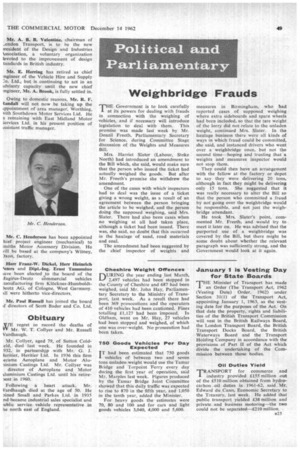Weighbridge Frauds
Page 51

If you've noticed an error in this article please click here to report it so we can fix it.
ITHE Government is to look carefully
at its powers for dealing with frauds in connection with the weighing of vehicles, and if necessary will introduce legislation to deal with them. This promise was made last week by Mr. Denzil Freeth, Parliamentary Secretary for Science, during Committee Stage discussion of the Weights and Measures Bill.
Mrs. Harriet Slater (Labour, Stoke North) had introduced an amendment to the Bill which, she said, would make sure that the person who issued the ticket had actually weighed the goods. But after Mr. Freeth's promise she withdrew the amendment.
One of the cases with which inspectors had to deal was the issue of a ticket giving a wrong weight, as a result of an agreement between the person bringing the article to be weighed, and the person doing the supposed weighing, said Mrs. Stater. There had also been cases when no weighing at all had taken place, although a ticket had been issued. There was, she said, no doubt that this occurred in the haulage of sand, road materials and coat The amendment had been suggested by the chief inspector of weights and
measures in Birmingham, who had reported cases of supposed weighing where extra sideboards and spare wheels had been included, so that the tare Weight of the lorry did not relate to the unladen weight, continued Mrs. Slater. In the haulage business there were all kinds of ways in which fraud could be committed, she said, and instanced drivers who went over a weighbridge once, but not the second time—hoping and trusting that a weights and measures inspector would not stop them.
They could then have an arrangement with the fellow at the factory or depot to say they were delivering 20 tons, although in fact they might be delivering only 15 tons. She suggested that it was really necessary to alter the Bill so that the person who committed a fraud by nof going over the weighbridge would be responsible, and not just the weighbridge attendant.
He took Mrs. Slater's point, commented Mr. Freeth, and would try to meet it later on. He was advised that the purported use of a weighbridge was covered by the Bill, but there might be some doubt about whether the relevant paragraph was sufficiently strong, and the Government would look at it again.




















































































































